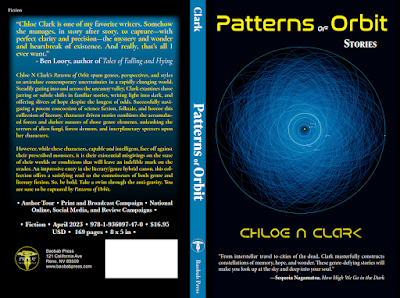 |
All of which leads me to a remarkable new collection by frequent ST contributor Chloe N. Clark, whose new book is rather wonderful. I'm proud to say that I accepted two stories here, 'Even the Veins of Leaves' and 'Who Walks Beside You'. They both stand up well, I'm glad to say, and are a good fit. This book is also concerned with inner space while not neglecting the outer kind. The themes and ideas range from interstellar voyages to lost loves. Some are 'true' short stories of several pages, many are vignettes (a thankfully revived art thanks to flash fiction) just a few paragraphs long. All are worth reading and then re-reading.
One recurring theme is disrupted reality, sometimes due to events that would not be out of place in a Hollywood blockbuster. Thus in 'The Ocean is Not Empty' a wife tries to find out what happened to her husband's submarine, which was lost because a crack opened in the ocean floor. Years later, he returns, having seen something that cannot be described. Instead of an action-adventure, it's the story of a relationship changed by something beyond human understanding.
Non-human understanding features also. 'There Is a World Within This Window' is narrated by an AI controlling a starship that gets into difficulties. The AI had to decide which of the colonists in suspended animation would live or die. 'Time is not kind to travellers' observes the software. However, when the ship makes planetfall, the survivors do not condemn the narrator, being too busy making plans. HAL-9000 rehabilitated?
Clark has a way with titles, as befits a poet. 'Even the Night Sky Can Learn to Be a First' is a vignette about anxiety over the state of the world. A woman seeks medical help as news stories manifest themselves as physical pain. At the same time, she ponders the universe, knowing that the galaxies themselves are ephemeral as any living thing.
In 'The Waves Hear Every Promise You Make' Lake Superior is 'churning' with fish and other species long thought extinct. 'These kinds of things don’t just happen all at once. One anomaly is discovery. Twenty is science-fiction.' The next stage of the phenomenon is even stranger, hinting at nature in rebellion against human incursion. The New Wave feel is strong here, as even experts are ultimately reduced to mere spectators of events they might discuss and even explain but can't influence.
This is a landmark collection. I would recommend it to anyone who likes short fiction, regardless of genre. Clark's detached yet humane narrators speak for many of us, amazed and delighted at the universe we find ourselves in but by no means sure how to cope with it.




No comments:
Post a Comment